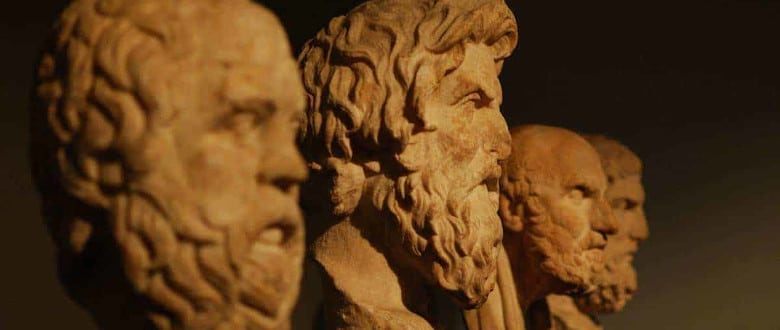In this passage from Book VIII of The Republic, Plato describes how democracy can arise from oligarchy and descend into tyranny. Starting with the oligarchical state, in which the rulers aim to become as wealthy as possible, Plato explains how oligarchy reduces many ordinary citizens to poverty. Eventually, the class of citizens who have been reduced to poverty become resentful of the rich and seize political power, distributing property and freedom equally among all citizens. However, just as an excessive desire for wealth leads to the downfall of oligarchy, an …
The Misery of Tyrants – a short reading from Plato’s Republic
“He who is the real tyrant, whatever men may think, is the real slave, and is obliged to practise the greatest adulation and servility, and to be the flatterer of the vilest of mankind.” In this passage from book nine of Plato’s Republic, Socrates finally responds to the challenge set by Glaucon in book two; speaking as devil’s advocate, Glaucon claimed that people want nothing to restrict their desire for more and more of everything. If anyone could profit from acting unjustly and guarantee that they could get away with …
The Nature and Defects of Oligarchy – a short reading from Plato’s Republic
“And so they grow richer and richer, and the more they think of making a fortune the less they think of virtue; for when riches and virtue are placed together in the scales of the balance, the one always rises as the other falls.” In this passage from book eight of Plato’s Republic, Socrates outlines the defects and eventual breakdown of oligarchy. Socrates describes oligarchy as “a government resting on a valuation of property, in which the rich have power and the poor man is deprived of it.” He claims …
The Allegory of the Cave – a short reading from Plato’s Republic
“Will he not fancy that the shadows which he formerly saw are truer than the objects which are now shown to him?” In this passage, from book seven of Plato’s Republic, Socrates describes an unusual cave in which prisoners have been chained since childhood. The prisoners in this allegory represent the majority of mankind who perceive only the shadows of reality and hear only the echoes of truth. They cling to their mistaken view of reality and have no desire to escape their prison. Only philosophers make the journey out …
The Parable of the Ship: The Importance of Knowledge in Political Decision-making – a short reading from Plato’s Republic
“The truth is, that, when a man is ill, whether he be rich or poor, to the physician he must go, and he who wants to be governed, to him who is able to govern.” In this passage, from book six of Plato’s Republic, Socrates argues that his ideal city can only come about if there is a union of political power with philosophy, in other words, political power must be in the hands of philosophers. Now, it is important to note that when Socrates says that philosophers should rule …
- Page 1 of 2
- 1
- 2
